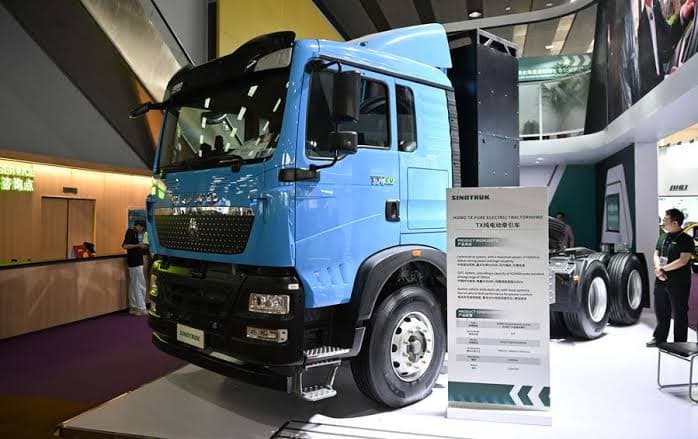We're loading the full news article for you. This includes the article content, images, author information, and related articles.
Chinese truck giant SINOTRUK's global expansion strategy, announced at its 2025 Partner Conference, is taking concrete shape in Kenya through a strategic local assembly partnership, signaling intensified competition in the East African commercial vehicle market.

GLOBAL – Chinese heavy-duty vehicle manufacturer SINOTRUK has laid out an aggressive global expansion plan, with emerging markets in Africa identified as central to its strategy, following major announcements at its 2025 Global Partner Conference. Held in Qingdao, China, on Wednesday, October 18, 2025, the conference brought together 620 partners from 97 countries and underscored the firm's robust growth and future international focus.
Company Chairman Liu Zhengtao reported that from January to September 2025, SINOTRUK's total vehicle sales reached 335,000 units, a 22.8% increase year-on-year, with heavy truck exports jumping 24.5% to 111,000 units. Looking ahead, the company has set a target to export 250,000 heavy trucks and 100,000 light trucks annually by 2030. This push is guided by five core transformation strategies: Sustainability, Digital Intelligence, Service Excellence, Global Expansion, and Business Diversification.
For Kenya, this global strategy is translating into significant local investment and industrial activity. A key development is SINOTRUK's strategic partnership with Kenya Vehicle Manufacturers (KVM) to assemble its vehicles locally. This move, confirmed by a Memorandum of Understanding signed on Monday, September 22, 2025, is designed to meet surging local demand, reduce vehicle delivery times, and bolster after-sales support.
Speaking at the signing ceremony, SINOTRUK International Vice President, Zhao Hua, identified Kenya as a vital market. “Partnering with KVM allows us to bring vehicles closer to our customers, respond quickly to market needs, cut logistics costs, and at the same time contribute to the country's industrial growth,” Hua stated on Monday, September 22, 2025.
This partnership aligns with the Kenyan government's National Automotive Policy, which promotes local manufacturing through incentives. The policy offers preferential tax rates for the importation of completely knocked-down (CKD) kits for local assembly, making locally produced vehicles more competitive against fully built imports.
Arvinder Reel, Managing Director of KVM, which is majority-owned by CFAO Mobility Kenya, emphasized the economic benefits. “This partnership reinforces our mission to grow local manufacturing and deliver high-quality assembly solutions. Working with SINOTRUK gives us an opportunity to support a fast-growing vehicle segment and create more value for the local economy,” Reel said. CFAO Kenya has separately announced a KSh 1 billion ($7.7 million) investment to modernize the KVM facility in Thika.
SINOTRUK has already established a formidable presence in Kenya's commercial vehicle sector. The company's HOWO brand commands a dominant 55% market share in the heavy-duty vehicle segment, according to data shared in May 2025 by local distributor PRINTAN. The brand's popularity is attributed to its perceived reliability, affordability, and suitability for challenging African terrains.
The company operates through two main local distributors. PRINTAN officially launched the new SINOTRUK HOWO MAX truck in Nairobi on Tuesday, May 6, 2025, targeting the long-distance freight and construction sectors. More recently, on Thursday, July 24, 2025, CFAO Mobility Kenya unveiled the locally assembled light-duty HOWO H2 and medium-duty H3 models, aimed at the urban distribution and last-mile logistics markets.
The move towards local assembly by a major player like SINOTRUK is set to increase competition for other established brands such as Isuzu East Africa and Toyota Kenya. It also signals a broader trend of international manufacturers deepening their industrial footprint in Kenya, leveraging the country's position as a strategic gateway to the wider East African Community market. The increased availability of locally assembled, competitively priced trucks is expected to have a significant impact on Kenya's logistics, construction, and agricultural sectors, which are key drivers of the nation's economy.
Keep the conversation in one place—threads here stay linked to the story and in the forums.
Sign in to start a discussion
Start a conversation about this story and keep it linked here.
Other hot threads
E-sports and Gaming Community in Kenya
Active 9 months ago
The Role of Technology in Modern Agriculture (AgriTech)
Active 9 months ago
Popular Recreational Activities Across Counties
Active 9 months ago
Investing in Youth Sports Development Programs
Active 9 months ago